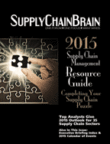
Visit Our Sponsors |
|
|
|
|
|
|
|
|
|
|
|
|
|
|
|
|
|
|
|
|
|
|
|
|
|
|
|
|
|
|
|
|
|
|
|
|
|
|

Reputation Institute's RepTrak model for corporate reputation measurement quantifies consumer perceptions of corporations worldwide. RepTrak measures both the emotional perceptions and the rational drivers of a company's reputation. Rational drivers have a defining impact on how consumers perceive companies and their willingness to buy products, recommend or work for a company.
The rational drivers of reputation are consumer perceptions of Products/Services, Innovation, Workplace, Governance, Citizenship, Leadership and overall Performance. Our research shows that companies with better reputations have reduced costs of doing business, higher market valuations and spend less time recovering from market downturns.
Supply chain performance has a major impact on all of the rational drivers of corporate reputation. Its impact is the biggest in manufacturing- and distribution-centric industries like consumer goods, food and beverage, automotive, or industrial products. A number of supply chain optimization strategies can achieve a dual goal of improving both supply chain and reputation metrics.
Such supply chain optimization strategies as supplier or customer collaboration, increasing visibility and transparency, moving towards more demand-driven processes – are also likely to help improve the overall corporate reputation:
• Having better relationship with suppliers helps detect potential issues before they turn into disasters, allowing companies to be more effective in anticipating problems and dealing with disruptions.
• Increased transparency in supply chain reporting and disclosure can help improve corporate reputation as a well-run company open about its business practices.
• Being more attentive in listening to customers enables a firm to not only better forecast demand, but also improve its reputation as a good communicator and a company that really cares about consumers.
In managing supply chain risks, companies often focus on the need to reduce cost and customer service implications of supply chain disruptions. What is missing from the conversation is the realization that supply chain disruptions can have a major impact on corporate reputation in general. If a new product release gets delayed, a company does not only suffer from immediate lost sales, but also incurs long-term damage in the form of reduced respect from business analysts and consumers, increased uncertainty on whether it can meet its own goals and weakened reputation as an organization that is not properly managed.
Global supply chain issues and disruptions often reveal a lack of care for companies’ extended or outsourced supply chain. When industrial accidents occur at suppliers’ or manufacturing defects get uncovered, companies’ global supply chains come into public view. There are many recent examples of how supply chain problems can have disastrous effect on corporate reputations – from deadly fires at textile factories in Bangladesh to contaminated food scandals, to defective airbags in millions of cars worldwide that put consumers at high risk. All of these examples highlight the long-term repercussions of the lack of strategic view of supply chain and its impact on corporate reputation.
The Outlook
Leading companies across the world are continuously working on turning their supply chains into competitive differentiators. As companies move towards viewing their supply chains as key drivers of growth, they should expand their strategic view to treat supply chain management as a major driver of corporate reputation. Innovative and value-chain oriented supply chain strategies can help companies emerge as reputation leaders and build up their strategic reputation capital.
RELATED CONTENT
RELATED VIDEOS
Timely, incisive articles delivered directly to your inbox.

